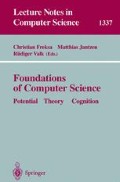Abstract
This article describes a parallel and distributed machine learning approach to a basic variant of the job assignment problem. The approach is in the line of the multiagent learning paradigm as investigated in distributed artificial intelligence. The job assignment problem requires to solve the task of assigning a given set of jobs to a given set of executing nodes in such a way that the overall execution time is reduced, where the individual jobs may depend on each other and the individual nodes may differ from each other in their execution abilities. Experimental results are presented that illustrate this approach.
Preview
Unable to display preview. Download preview PDF.
References
Chan, P.K., & Stolfo, S.J. (1995). A comparative evaluation of voting and meta-learning of partitioned data. In Proceedings of the Twelfth International Conference on Machine Learning (pp. 90–98).
Daley, R.P., Pitt, L., Velauthapillai, M., Will, T. (1991). Relations between probabilistic and team one-shot learners. In Proceedings of the Workshop on Computational Learning Theory (pp. 228–239).
Davies, W., & Edwards, P. (1997). The communication of inductive inferences. In [10].
Garey, M.JR., & Johnson, D. (1979). Computers and intractability. New York: Freeman.
Jain, S., & Sharma, A. (1995). On aggregating teams of learning machines. Theoretical Computer Science A, 137(1), 85–108.
Pitt, L., & Smith, C. (1988). Probability and plurality for aggregations of learning machines. Information and Computation, 77, 77–92.
Provost, F.J., & Hennessy, D.N. (1995). Distributed machine learning: Scaling up with coarse grained parallelism. In Proceedings of the Second International Conference on Intelligent Systems for Molecular Biology (pp. 340–348).
Sen, S. (Ed.) (1996). Adaptation, coevolution and learning in multiagent systems. Papers from the 1996 AAAI Symposium. Technical Report SS-96-01. AAAI Press.
Sikora, R., & Shaw, M.J. (1991). A distributed problem-solving approach to inductive learning. Faculty Working Paper 91-0109. Department of Business Administration, University of Illinois at Urbana-Champaign.
Weiß, G. (Ed.) (1997). Distributed artificial intelligence meets machine learning. Lecture Notes in Artificial Intelligence, Vol. 1221. Springer-Verlag.
Weiß, G., & Sen, S. (Eds.) (1996). Adaption and learning in multi-agent systems. Lecture Notes in Artificial Intelligence, Vol. 1042. Springer-Verlag.
Author information
Authors and Affiliations
Editor information
Rights and permissions
Copyright information
© 1997 Springer-Verlag Berlin Heidelberg
About this chapter
Cite this chapter
Weiß, G. (1997). The job assignment problem: A study in parallel and distributed machine learning. In: Freksa, C., Jantzen, M., Valk, R. (eds) Foundations of Computer Science. Lecture Notes in Computer Science, vol 1337. Springer, Berlin, Heidelberg. https://doi.org/10.1007/BFb0052113
Download citation
DOI: https://doi.org/10.1007/BFb0052113
Published:
Publisher Name: Springer, Berlin, Heidelberg
Print ISBN: 978-3-540-63746-2
Online ISBN: 978-3-540-69640-7
eBook Packages: Springer Book Archive

